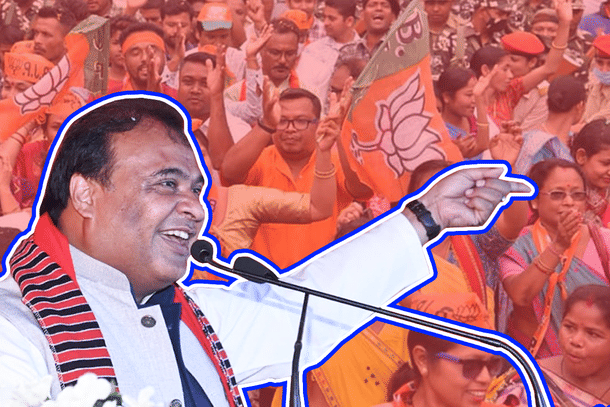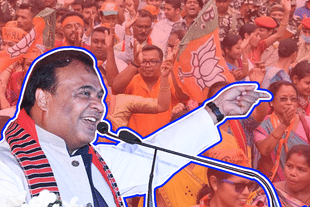Ground Reports
Hridayapath, Dispatch #10: Saffronisation Of Assam Has Made The "Psychological Reintegration" Complete
Banuchandar Nagarajan
Apr 23, 2024, 10:58 AM | Updated Aug 09, 2024, 12:09 PM IST
Save & read from anywhere!
Bookmark stories for easy access on any device or the Swarajya app.


It is clearly evident that the Assamese society is steadily getting saffronised. The Hindu identity gets revealed politely, but firmly, in conversations.
It can be argued with a fair degree of confidence that Hindutva politics has provided the scaffold for the full "psychological re-integration" of the North East with rest of India.
As a young backpacker, this author had visited the North East in the early 2000s. The feeling of belonging to the larger nationhood has undoubtedly become stronger now to such an extent that the current Assamese Chief Minister is daring to dream of a larger national role by positioning himself as a Hindu Hridaya Samrat.
Culture is just one arrow in the quiver deployed in Assam and perhaps in Manipur too, where the Meiteis form the core support base (while the Kuki problem remains).
Prime Minister Narendra Modi has dipped on to the anti-China mindset in Arunachal. In Meghalaya and Nagaland, the Bharatiya Janata Party (BJP) has waded into local politics and stitched coalitions with nationalistic local parties.
Mizoram remains the final-frontier for the BJP in the North East. All of these approaches have been topped-up by relentless focus on infrastructure development and good governance.
People have not fully grasped the significance of this achievement. The reduction of psychological distance is very vital for our territorial integrity, sovereignty and national security.
Let us not forget that, in the 1962 war with China, when prime minister Jawaharlal Nehru threw in the towel in that fateful radio address and had asked Assamese to fend for themselves, the Chinese army had advanced till Tezpur.
Given the increasingly aggressive China, the heavily-funded proselytising churches eating away at tribal traditions and inimical social organisations that try to widen social fault lines, any analyst watching the North East would have told you that allocating funds to North East alone will not suffice.
The funds too got re-routed to coffers of the Congress's apparatchiks during the UPA (United Progressive Alliance) regime leaving the region in shambles is just another cruel twist.
Only someone like Prime Minister Modi, who has wandered in these parts, and knows people "from the heart", could have devised a thoughtful and detailed multi-pronged strategy.
Strategic experts have posited a theory that Indian rulers have been unable to focus adequately on foreign affairs as political energies were prioritised for reconciling the vast diversity and preserving domestic unity.
The peace and development in the North East, hence, has freed up mind-space for designing effective strategic moves, especially in our eastern frontier.
The beneficiaries of the master plan might not be able to articulate the grand design in detail, but they can feel the earnestness of the efforts and appreciate the real change on the ground — like the poor but happy elderly couple running a small eatery in Mangaldoi.
I asked the lady Rinku Bora on who she is going to vote for. "The BJP only, who else?! All of Assam has become BJP". She says that in the last 10 years "theek hua hai". Perhaps not the most eloquent words I have heard in the previous week of travel, but it was touching.
(She then discusses the economics of running the shop from a bamboo hut with verve. I learn from her that to make a simple shop with bamboo sticks it costs around Rs 50,000. It takes about a month to build it. It stands for around three years provided there are no mites.)
Kya "Theek Hua Hai"?
Prime Minister Modi has visited the North East more times than any prime minister before him. He is the self-anointed ambassador of the North East to the rest of the country.
The much-publicised Bogibeel Bridge, which became operational 16 years after it was announced, stands witness to the contrast in approaches — the apathy New Delhi had accorded to the North East in the past and sincerity of the current regime.
Let us look at the major highlights of what has been done on the two fronts — suraksha and vikas
Security
1. Peace Accords with Bodo, Karbi, Naga tribes
2. 75 per cent reduction AFSPA regions
3. 75 per cent reduction in insurgency compared to 2014
4. 90 per cent reduction in causalities of security forces
Development
1. PM Modi has vowed to connect all north eastern states with broad-gauge line. The first ever goods train reached Manipur in 2022 and Meghalaya in 2023.
2. Assam's roads are world-class. 4,000 kms of roadways have been built
3. Seven new airports
4. 12 new medical colleges were built, including the first AIIMS (All India Institute of Medical Sciences).
Now, why would not Assam paint itself saffron? PM Modi has trumped in both politics and administration. It will be hard to beat the BJP in Assam in the many years to come.
Hospitality Focus
The Assam government has focussed on skill-building for the hospitality industry in a big way. There are free three-month certificate courses sponsored by the government. Apart from that, there are one-year ‘hotel management’ courses offered by colleges. Women have been the biggest beneficiaries of the initiative.
The focus on hospitality services is quite a smart thing to do, given that manufacturing is yet to take-off in the state. Hopefully, the multi-modal logistics park will herald the change in mindset of the Assamese. Their experience with tea-manufacturing and exports might come in handy.
There is real excitement about the Rs 27,000 crore semiconductor assembly and testing facility of the Tata Group at Jagiroad. Chief Minister Sarma has announced that the first chip from the facility will come out by 2025. The success could mean Assam's glory on the global stage.
Bishu, the hotel manager in Jorhat has a degree in English. Additionally, he has completed a diploma course in hospitality management. He says that he is sought after for his skills and gets calls from Guwahati and other parts of India with job offers. He has chosen to stay close to his parents that live in the neighbouring Golaghat.
He says he "has no time for" politics and just "wants to make money". He does not know the name of his MP (Member of Parliament). He seems very excited about the many opportunities before him to grow professionally.
After a bit of thought he says that two pleasing changes have happened over the last few years.
First, corruption has been almost eliminated in government recruitment. Jobs are now accessible to everybody.
Second, the power supply situation has seen amazing transformation. That is good feedback from an apolitical youngster.
(He tells me that all of his siblings have names starting with ‘B’ and ending in ‘U’ — Bishnu, Bindu and Bishu. I cheekily suggested that the next baby be named Banu.)
We Often Forget The Mobile
My driver has been my man-Friday through this trip, observing all of my interactions. He is from Sikar in Rajasthan. As we begin our return journey, I ask him what he thinks about things he has seen so far.
He says that he is very happy to know that government schemes are reaching the poorest in the most distant parts of the country. People have become more aware and have started demanding performance.
More than politicians, he feels that mobile phones have created the actual kamaal. Becoming aware of entitlements and following-up without wasting much time through the smartphone is the asli jadoo.
He contends that it is just the beginning and as people, especially women, become literate and more aware he sees much brighter prospects for the country. "Tab dekhna," he says assertively.
There is truism to the fact that PM Modi's political genius has been complemented not just by a clueless opposition, but also the Jio revolution (and by extension, the JAM trinity).
So Long, Ahom!
The roads in Kokrajhar are ‘makkan jaisa’. Kokrajhar comes under the Bodoland Autonomous Council. It is hard to imagine that these were the badlands of the United Liberation Front of Asom (ULFA) just a few years ago.
People of Kokrajhar are reticent to speak about politics. I finally catch hold of a ‘supari’ farmer (who refuses to share his name or be photographed). He says that things have improved, but quite a lot needs to be done. He says it is a big relief that violence has ended and people need not fear for their lives anymore and can move around freely.
He gets Rs 6,000 under PM Kisan scheme. A local Food Corporation of India (FCI) godown will help betelnut farmers here. I ask about the fantastic roads in the area.
He says that the newly-elected chief executive member (who is from the UPPL, a NDA constituent) has worked closely with Chief Minister Himanta Biswa Sarma and focused on repairing rural roads.
The two-wheeler showroom in town is making brisk sales. He says disdainfully that cash still goes around during elections and people can be swayed.
Starting from 1977, Kokrajhar has been sending independent MPs to Parliament (except for 2009-14). (Nerdy Swarajya folks can add this to their quiz!)
In 2014, it elected Naba Kumar Sarania, who won by record margin of 3.5 lakh votes — highest ever for an independent candidate in Lok Sabha elections. He won again in 2019, but the margin reduced to 35,000. Naba Kumar is none other than ‘Heera’ Sarania, the dreaded commander of the ULFA.
After the close call in the 2019, Sarania tried to get it into state politics by contesting assembly elections in 2021. He lost badly getting only 19 per cent vote-share. He is not contesting in 2024. UPPL has named MLA, Joyanta Basumatarai, as the candidate. He is the frontrunner to win the elections.
We cross the tributaries to Brahmaputra, Manas and Sankosh, which form Assam's border with West Bengal.
Adieu to ‘ascending Assam’.
This report is part of Swarajya's 50 Ground Stories Project - an attempt to throw light on themes and topics that are often overlooked or looked down. You can support this initiative by sponsoring as little as ₹2999. Click here for more details.
Read the previous articles in this series:
Hridayapath, Dispatch 4 — 'Phirse Modi Ho, Bihar Me Bahar Ho'
Hridayapath, Dispatch 5: Too Much Negativity Peddled About Bihar — Notes From Mithila And Seemanchal
Hridayapath, Dispatch 6: North Bengal — A BJP Fortress In The Making
Hridayapath, Dispatch 8: On Politics, Progress, And Poetry From Assam
Banuchandar is a political and public policy advisor. He posts at @Banu4Bharat.




